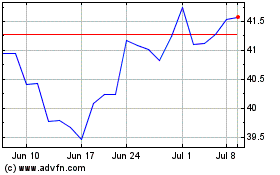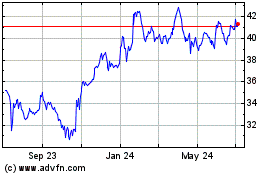By Lillian Rizzo and Drew FitzGerald
Internet companies like Charter Communications Inc. and Verizon
Communications Inc. provided hundreds of thousands of free service
to cash-strapped Americans this spring after the coronavirus
pandemic sent millions of workers and students home. The relief
came with an expiration date: July 1.
Several broadband and cellphone carriers are free to start
cutting off past-due accounts and charging late fees after the
Federal Communications Commission's Keep Americans Connected
program expired on Tuesday. The federal telecom regulator secured
voluntary commitments from hundreds of internet providers in March,
when the disease outbreak forced millions of Americans to work from
home and put millions more out of a job.
The program was never designed to be a permanent fix. Some
internet companies told regulators they couldn't foot customer
bills past June, though there is still no end in sight to the twin
health and economic crises that first prompted the pledge. FCC
Chairman Ajit Pai told lawmakers last week that Congress will need
to act to help keep service affordable.
"The Keep Americans Connected Pledge has been a success, and the
FCC thanks all of the companies that have stepped up to the plate
to do the right thing during this national emergency," an FCC
spokesman said. "But broadband and telephone companies, especially
small ones, cannot continue to provide service without being paid
for an indefinite period of time."
Gigi Sohn, a former FCC official under Democratic Chairman Tom
Wheeler, said internet providers had no legal obligation to
continue the relief programs because the current chairman ceded the
oversight authority it would need to do so.
"What they promised was the bare minimum," she said. "This was
the best he could get the industry to promise."
The debate has shifted to Capitol Hill, where lawmakers are
proposing several measures to make internet access more affordable
during the pandemic. House Democrats in May proposed a bill that
would establish an emergency broadband fund to help qualifying
households afford service. Another bill proposed by Senate
Democrats pitched similar provisions. It isn't clear when either
bill might become law.
Under Keep Americans Connected, companies agreed to waive late
fees and avoid disconnections for nonpayment. Some cable providers
offered free Wi-Fi hotspot access in business zones. Several
companies also offered free or discounted service to households
with students and teachers, though those offers weren't explicitly
required under the pledge.
Most stay-at-home orders were instituted in mid-March. During
that time, Altice USA Inc.. added about 9,000 free 60-day broadband
accounts; Comcast Corp. signed up 32,000; and Charter had 119,000
households sign up.
Free 60-day Comcast internet access is only available to those
that qualify for Internet Essentials, a low-income program that
normally costs $9.95 a month, plus tax. The company extended that
offer through 2020.
Charter expects to have signed up more than 400,000 households
in total.
At the outset, long call wait times created hurdles for some
users who sought immediate access to free internet service.
Antigone Cox, a seventh-grade teacher in the Bronx, N.Y., said
in March she sat on hold for hours for Altice's Optimum service to
help two students sign up. She spent two to three days assisting
parents.
"It caused issues with some kids that were overwhelmed about
what they were missing," Ms. Cox said. Once the parents finally
connected with Optimum, it took a few days to have the internet
turned on.
Some internet providers said they warned customers that the
grace period for waivers and free internet access will end.
"We will also work with those customers who had collection
efforts suspended to get their billing current and keep them
connected," beginning July 1, a Charter spokeswoman said.
Rather than lose customers faced with high balances from paused
payment periods, Charter will consider the debts that piled up
during the second quarter -- April through June -- a balance-sheet
"write-off," Charter's chief financial officer, Christopher
Winfrey, said at a June conference.
About 140,000 residential Charter customers avoided
disconnection, and collection efforts paused, during the first
quarter. Of that number, 1,000 customers would have normally been
disconnected. By the end of April, 67,000 of those customers had
"past due balances beyond the point of normal disconnection,"
according to public filings.
A Verizon spokeswoman said hundreds of thousands of wireless and
home-internet customers who signed up for billing relief under the
pledge will be automatically enrolled in the telecom giant's
repayment program starting Wednesday.
AT&T Inc., which earlier this year reported providing
temporary relief to more than 156,000 customers, said cash-strapped
subscribers can still call the company for payment options.
AT&T also plans to waive the overage fees it charges some home
broadband customers for heavy data usage through Sept. 30.
Altice noted in public filings during the first quarter that
roughly 6,000 customers weren't disconnected due to the pledge. An
Altice spokesman said the company's "goal as the programs conclude
is to work with our customers to find solutions and plans that meet
their needs and budgets," without giving specifics.
Comcast said it won't disconnect anyone on July 1, with the goal
of working with individuals toward the best payment-plan options.
The company earlier started offering cash-strapped customers
flexible payment plans.
"Our commitment to keeping people connected doesn't end on June
30," said Dana Strong, president of consumer services at Comcast
Cable. "We're opening the nation's largest network of public Wi-Fi
hotspots for free through 2020, extending our Internet Essentials
offer and are working with customers on flexible payment options
that work for them."
Write to Lillian Rizzo at Lillian.Rizzo@wsj.com and Drew
FitzGerald at andrew.fitzgerald@wsj.com
(END) Dow Jones Newswires
July 01, 2020 11:45 ET (15:45 GMT)
Copyright (c) 2020 Dow Jones & Company, Inc.
Verizon Communications (NYSE:VZ)
Historical Stock Chart
From Mar 2024 to Apr 2024

Verizon Communications (NYSE:VZ)
Historical Stock Chart
From Apr 2023 to Apr 2024
